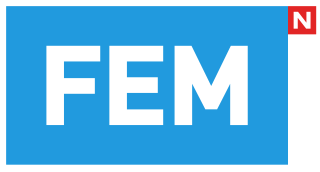
NRK, an abbreviation of the Norwegian Norsk rikskringkasting AS, generally expressed in English as the Norwegian Broadcasting Corporation, is the Norwegian government-owned radio and television public broadcasting company, and the largest media organisation in Norway. All other TV channels, broadcast from Norway, were banned between 1960 and 1981. NRK broadcasts three national TV channels and thirteen national radio channels on digital terrestrial television, digital terrestrial radio and subscription television. All NRK radio stations are streamed online at NRK.no, which also offers an extensive TV service. NRK is a founding member of the European Broadcasting Union.
TVNorge is a Norwegian television channel.
Fleksnes Fataliteter, better known by its shortened title Fleksnes, was a Norwegian-Swedish-Danish television comedy series produced between 1972 and 2002, created by Swedish writer Bo Hermansson and based on Galton and Simpson's scripts for the British series Hancock's Half Hour.
Sky Television plc was a public limited company which operated a nine-channel satellite television service, launched by Rupert Murdoch's News International on 5 February 1989. Sky Television and its rival British Satellite Broadcasting suffered large financial losses, and merged on 2 November 1990 to form British Sky Broadcasting. A programming merger took effect on 1 December 1990.

CITV is a British free-to-air children's television channel owned by ITV plc. It broadcasts content from the CITV archive and acquisitions, every day from 6 am to 9 pm which was previously 6 am to 6 pm until 21 February 2016. It is also the title of a programming block on the ITV network at weekends.

Disney Channel is a Scandinavian children's channel owned and operated by The Walt Disney Company Nordic.

Harald Heide-Steen Jr. was a Norwegian actor, comedian and singer. He was the son of Harald Heide Steen.

Rolv Helge Wesenlund was a Norwegian comedian, singer, clarinetist, writer and actor.
Score was the weekend sports service of the Financial News Network which aired sports-themed programming starting in 1985. It was renamed FNN Sports in 1989 after FNN decided to go with a 24-hour feed on weekdays a year earlier. Score was closed when CNBC bought out FNN in 1991.
Gunnar Haugan was a Norwegian character actor most commonly associated with his appearance on radio and television programs.
Norges Televisjon AS, or NTV, operates the digital terrestrial television (DTT) network in Norway. The infrastructure is owned by the Telenor-subsidiary Norkring, while the content is provided by the Norwegian Broadcasting Corporation (NRK) and RiksTV. The company is owned in equal parts by NRK, TV 2 and Telenor. The same companies also own RiksTV. RiksTV offers a range of pay television channels.

Petter Wilhelm Blichfeldt Schjerven is a Norwegian television host, known from Typisk norsk which aired on NRK, the Norwegian Broadcasting Corporation. Schjerven has previously worked as the host and scriptwriter for the children's program Midt i smørøyet and as the producer of the radio program Holger Nielsens Metode on NRK P3, among others. After Typisk norsk he hosted the shows Eva og Adam and Tingenes tilstand on NRK and Typisk deg on TVNorge.
Television in Norway was introduced in 1954, but the first television program was only shown in 1958, and regular broadcasts did not start until 1960. Like in Denmark, Norway had only one television channel until the 1980s. Some 40% of the population have cable TV, and 30% have satellite TV. Another 30% have terrestrial television only.
RiksTV is the distributor of pay television in the Norwegian digital terrestrial television network.

FEM is a Norwegian television channel targeting young women. It broadcasts from London and is the second channel of TVNorge, part of Warner Bros. Discovery EMEA.
Leonardstatuetten is a prize awarded by the Norwegian Comedy Writers' Association. The award is named after revue instructor, composer and director Einar Leonard Schanke (1927–1992), who was one of Norway's most important revue personalities. The prize is regarded the highest distinction in Norwegian revue. Awarded from 1968 to 2013, the statuette was given to persons with a significant and lasting importance to Norway's entertainment industry. The statuette was again awarded in 2019, when Eldar Vågan was the recipient.
TVNorge HD is a High Definition television channel in Norway. The channel is a joint venture by TVNorge and cable and satellite-TV distributor Canal Digital which started broadcasting on October 3, 2008. It's the first Norwegian high definition channel, but currently only some of its contents is available in HD. The HD station has the same schedule as the SD station. Broadcasts not available in high definition are broadcast in standard definition.
Ivar Skippervold is a Norwegian singer and musician.
Bør Børson jr. is a satirical novel from the boom period during World War I, written by Norwegian writer Johan Falkberget. It was first published as a feuilleton in the satirical magazine Hvepsen in 1917, then again printed as a feuilleton in the newspaper Nidaros, and issued as a book in 1920. The story was a great success, and has later been adapted into two films, a comedy, a musical, and a comic series.
Leif Erik Forberg is a Norwegian television presenter with a long career in both TV and radio. Forberg has served as a presenter for NRK, TVNorge, TV3, P4, and Kanal24. In the 1990s he was known as the presenter for the program Casino on TVNorge and Komplottet on TV3.







